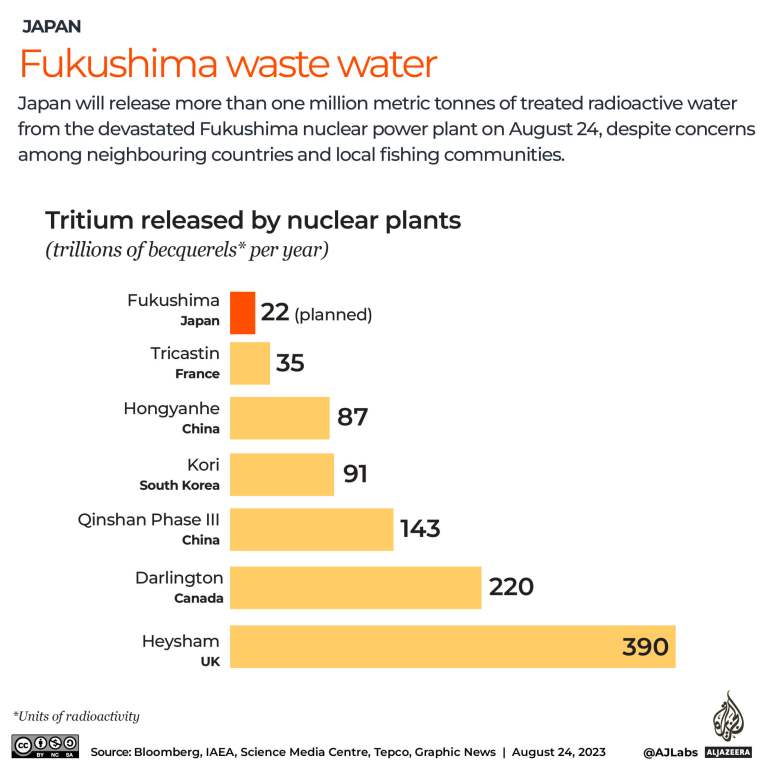China has been the most vocal opponent to the release plan, a key part of Japanese efforts to decommission the plant that was destroyed in the 2011 earthquake and tsunami.
Japan has sought to reassure critics about the discharge and the United Nations’s nuclear watchdog has said the process meets international standards, but Beijing remains unconvinced.
Last week, as the first water began to trickle into the ocean, China banned all Japanese seafood imports. Other countries have also stepped up inspections of Japanese aquatic products while there have been protests in South Korea and Japan itself.
On Tuesday, Japan’s foreign minister confirmed media reports that a brick had been thrown at its embassy in Beijing and said embassy staff had been the target of numerous crank calls originating in China.
He called on Beijing to take steps to calm the situation.
“It is extremely regrettable and worrying,” Yoshimasa Hayashi told reporters in Tokyo.
“We would like to urge the Chinese government again to take appropriate measures immediately, such as calling on its citizens to act calmly to prevent the situation from escalating, and to take all possible measures to ensure the safety of Japanese residents and our diplomatic missions in China,” he said.

On Monday, a spokesman for China’s foreign ministry said it was not aware of the matter when asked about the accusations of harassment at a regular briefing.
“China protects and ensures the safety and lawful rights and interests of foreign nationals in China in accordance with laws,” Wang Wenbin said, before going on to chastise Japan over the water release.
The water should be disposed of in “a truly responsible way,” he said.
Japan began releasing more than 500 Olympic swimming pools worth of treated and diluted wastewater from Fukushima on August 24. The water, used to cool the damaged reactors, is currently being kept in giant tanks around the site.
All radioactive elements have been filtered out of the water with the exception of tritium, an isotope of hydrogen that is hard to remove but has been reduced to within safe limits. Tritium is also released by nuclear power stations during their normal operation, including by China.
Spike in nuisance calls
Japan has urged its citizens in China to keep a low profile and has increased security around schools as well as diplomatic missions since the discharge began.
In Beijing, a spokesperson at the Japanese Embassy told the AFP news agency that staff were “extremely worried”.
“Some individuals have come to our [embassy] entrance,” the spokesperson said.
“They took these kinds of actions, then were led away by armed police.”

A range of businesses and government offices in Japan, including the Fukushima city hall and schools in the area, have reportedly been subjected to thousands of abusive calls from the China country code +86 since Thursday.
Japanese public broadcaster NHK said many of the callers shouted in Chinese and some yelled “stupid” as well as other swear words.
The harassment prompted Vice Foreign Minister Masataka Okano on Monday to summon the Chinese ambassador, Wu Jianghao, to ask that Chinese people act calmly and responsibly.
But the Chinese Embassy in Tokyo released a statement saying it had lodged stern representations with Japan about the Chinese Embassy and consulates in Japan receiving “a large number of nuisance calls from Japan”.
The calls have caused “serious interference in the normal operation of the embassy and consulates”, Wu said, according to an embassy statement.
The discharge of the water is expected to take between 30 and 40 years.

All seawater and fish sampling data since the release have been well within set safety limits.
Economy and Industry Minister Yasutoshi Nishimura visited Fukushima on Monday to help with damage control. He joined officials from a supermarket chain and sampled locally caught surf clams and flounder.
“While safely carrying out the release, we will be transparent in disclosing all data,” Nishimura said. “That’s the best way to fight reputational damage.”
